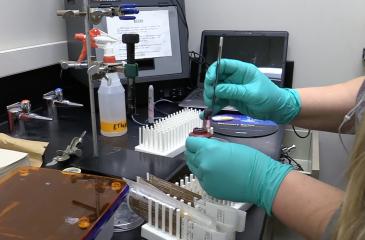GOING VIRAL
Viruses have a unique way of capturing our imagination, but can be terrifying when they emerge and threaten loved ones, global health, and even the economy.
The names of some viruses alone can strike fear into the hearts of many: influenza, HIV, Zika, Ebola, rabies, polio, and the rapidly changing COVID-19 (coronavirus) outbreak. However, virologists know that viruses are both fascinating and have had a profoundly positive impact on public health and society. And they are everywhere … including viral DNAs integrated long ago into our own genome.
For researchers in the Institute for Molecular Virology, studying viruses goes far beyond personal and public health―the Institute’s collaborative work spans the University campus and gives the phrase “going viral” a whole new meaning. And this wide-spanning breadth is one that fully embraces the land-grant mission of our institution.
Viruses’ molecular attributes, small size, and ability to hijack cell machinery to multiply, has led to important fundamental discoveries that have allowed for their use as tools, probes, and for use in genetic engineering and gene therapy.
Viruses can cause devastating diseases of animals and plants vital to the food supply. Many viruses can infect and be transmitted by insects, which can pose threats to a variety of animal and plant species, which emphasizes the complex interrelationships between viruses, many distinct hosts, and the environment. And viruses of bacteria continue to contribute new knowledge to biology, ranging from how biological molecular motors function to providing new approaches for gene editing. Microbiome research helps to emphasize the lack of current knowledge and understanding of the virome, and how viruses likely improve and protect the health of their hosts.
Business and public policy areas use data to learn about how viruses impact human, animal and plant populations - and devise strategies to address health, economic, ethical and legal implications.
The Institute for Molecular Virology offers an excellent example of how reaching out beyond the health sciences can lead to productive collaborations that benefit us all.
Thank you.
Louis Mansky, PhD Jakub Tolar, MD, PhD
Director for Institute for Molecular Virology VP for Clinical Affairs
NEWS

01 INCREASING CARDIAC ARREST SURVIVAL RATE
The University of Minnesota Twin Cities, The Leona M. and Harry B. Helmsley Charitable Trust and healthcare systems across the Twin Cities, announce the creation of the Minnesota Mobile Resuscitation Consortium and its mobile extracorporeal membrane oxygenation (ECMO) vehicles. This is a collaborative initiative to treat cardiac arrest as quickly as possible in Minnesota. The 24-7 mobile life support program is the first in the nation to serve multiple healthcare systems.
Read more on ECMO

02 REIMAGINE HEALTH: WHAT HUMOR & CREATIVITY CAN TEACH US ABOUT INNOVATION
Barry Kudrowitz, PhD, director of product design in the College of Design, is a firm believer that humor and creativity can fuel innovation. He has years of experience working with the toy industry and has taught toy design for over a decade. The strong medical community drew him to Minnesota. He saw an opportunity to grow the design field toward the medical and healthcare industry.

03 CLINICAL AFFAIRS & U
OACA is excited to announce upcoming Clinical Affairs & U events. Hosted by our centers and institutes, this open-house event is an opportunity for anyone around the University to stop in, have a cup of coffee with leadership, and talk about questions, ideas, or topics related to clinical affairs. RSVP now!
- Wednesday, March 18, 2020
Host: Masonic Cancer Center - Thursday, April 9, 2020
Host: Center for Global Health and Social Responsibility - Wednesday, May 13, 2020
Host: Clinical and Translational Science Institute

04 QUESTION, PERSUADE, REFER (QPR)
On March 3 learn the three steps anyone can take to help prevent suicide. Just like CPR, Question, Persuade, Refer (QPR) is an emergency response to someone in crisis and can save lives. QPR is the most widely taught gatekeeper training program in the United States, and more than one million adults have been trained in classroom settings in 48 states.
This seminar is part of an ongoing seminar series by CTSI that offers learning opportunities for faculty, staff, trainees, and students on a variety of research-related topics.

05 GENE EDITING AND 21ST CENTURY FOODS—WHY YOU WILL WANT TO EAT THEM
On March 5, Dan Voytas, PhD, will tell the story of a gene editing technology he developed and the company he founded that created the world's first gene edited food ingredient. Perry Hackett, PhD, will describe how gene editing will be used in farm animals to improve animal welfare, nutrition and the environment. This talk, hosted by the Department of Genetics, Cell Biology and Development, is one of three events in their public conversation series called, "The Leading Edge."

06 FREE WEBINAR, MINDFULNESS AT WORK
Join the University of Minnesota's Earl E. Bakken Center for Spirituality & Healing for an introduction on mindfulness at work on March 18, led by Mariann Johnson. This session will include an introduction to mindfulness and will explore ways in which mindfulness relates to essential workplace skills, such as regulation, resilience, and cognitive flexibility.
Register now.

07 BRING PHARMACOGENOMICS INTO PRACTICE
Pharmacogenomics is the science of how an individual’s genetic background affects response to medications—and the field has left the research realm to emerge as an important tool for clinical care. The biennial pharmacogenomics conference on June 11-12 is for healthcare professionals interested in implementing pharmacogenomics into clinical care.



